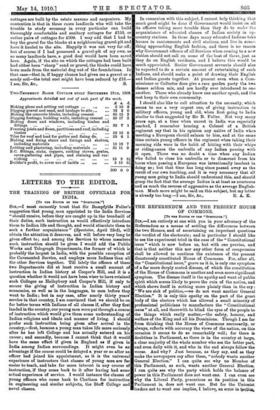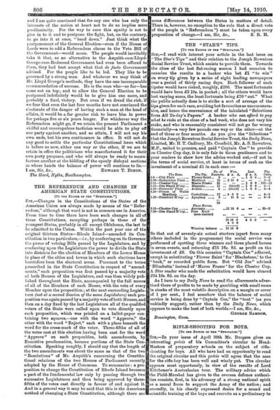THE REFEREND1TM AND THE PRESENT HOUSE OF COMMONS.
[To THZ EDITOR OF THZ SFICTAT011.1 S111,—I am entirely at one with you in your advocacy of the Referendum as a means of settling the differences between the two Houses, and of ascertaining on important questions the verdict of the electorate; and in particular I should like to see the experiment tried in the case of the "Constitutional issue" which is now before us, but with one proviso, and that is that neither this nor any other form of compromise shall be allowed to continue the existence of the present disastrously constituted House of Commons. For, after all, the "Constitutional issue," grave as it is, is only one symptom of a far more deeply seated disease, of which the constitution of the House of Commons is another and even more significant symptom. The disease itself is the apathy and want of public spirit which seems likely to prove the ruin of the nation, and which shows itself in nothing more plainly than in the cry : "We are sick of politics,—we do not want another General Election." It is only this apathy on the part of the great body of the electors which has allowed a small minority of professional politicians to manufacture the "Constitutional issue" at all, and therewith to blind the eyes of the people to the things which really matter,—the safety, honour, and welfare of the King and all his Dominions. Though I am far from thinking that the House of Commons necessarily, or always, reflects with accuracy the views of the nation, on this occasion it seems to do so remarkably well; for there is doubtless in Parliament, as there is in the country at large, a clear majority of the whole number who see the better part, and even daily with it, and who in the end always follow the worse. And why ? Just because, as they say, and as they make the newspapers say after them, "nobody wants another General Election." I can quite see why no Member of this Parliament, as such, wants another General Election. I can quite see why the party which holds the balance of power in this Parliament does not want one. I can even see why the Liberal Party, precarious as its position in this Parliament is, does not want one. But for the Unionist leaders not to want one implies, I believe, an error in ta,ctieo, and I am quite convinced that for any one who has only the interests of the nation at heart not to do so implies mere pusillanimity. For the way to cure this apathy is not to give in to it and to postpone the fight, but, on the contrary, to go into it at once, "bead down." Just think what the postponement of the General Election—even if the House of Lords were to add a Referendum clause to the Veto Bill of 01,-. Government—would mean. The people would inevitably take it that, as no alternative to the Asquith-cum-Lloyd- George-cunt-Redmond Government had even been offered to them, they had best accept what that de facto Government advised. For the people like to be led. They like to be governed by a strong man. And whatever we may think of Mr. Lloyd George's methods, they have the one incomparable recommendation of success. He is the man who—so far—has come out on top ; and to allow the General Election to be postponed indefinitely would be to give him one more, and probably a final, victory. But even if we dread the risk, if we fear that even the last four months have not convinced the electorate of the danger of having such a man at the head of affairs, it would be a far greater risk to leave him in power for perhaps five or six years longer. For whichever way the Referendum might go, if we retain the present Parliament a skilful and unscrupulous tactician would be able to play off one party against another, and so attain, I will not say his own ends, but his own continuance in office. It will not do any good to settle the particular Constitutional issue which is before us now, either one way or the other, if we are to retain in office the politicians who manufactured it for their own party purposes, and who will always be ready to manu- facture another at the bidding of the openly disloyal sections in whose hands the balance of power will continue to lie.-
1 am, Sir, &C., EDWARD T. DIXON. The Hard, Hythe, Southamptcnt.







































 Previous page
Previous page